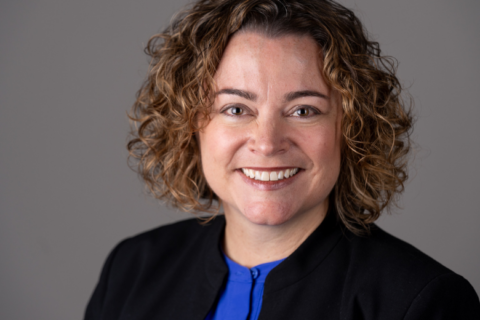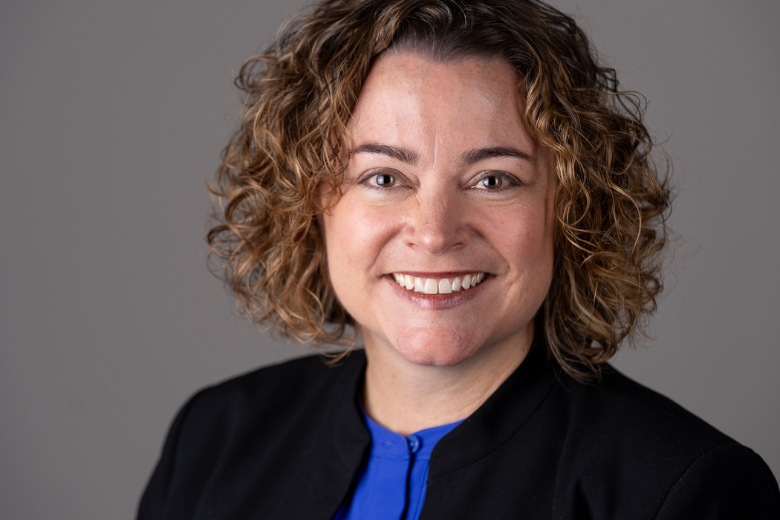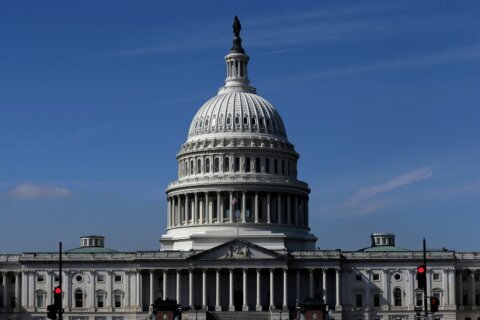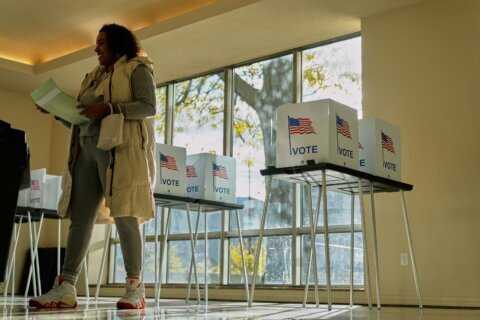The presidential candidates are speaking with anyone who will listen to try and get their vote. Millions of people are voting early, and it’s all leading to Nov. 5 and that one major question: Who won?

The Associated Press is the news organization we here at WTOP, and hundreds of other newsrooms across the country, rely on to call the races, including for the top office in the land.
But how do they do it?
Associated Press Washington Bureau Chief Anna Johnson sat down with WTOP’s Dimitri Sotis to talk about what they call “the single biggest act of journalism there is.”
Listen to the full conversation and read the transcript below:
The transcript below has been lightly edited for clarity.
Dimitri Sotis: Anna, thank you very much for a bit of your time. You are tracking thousands of competitive races again this year, as the AP has done so many times before, and you all have what I think is a terrific expression for what you do on election night, “the single biggest act of journalism there is.” Tell me about that.
Anna Johnson: That’s true. We often joke about that. And, in fact, we think it’s likely the case. And truly, because we have thousands of people all around the country that are working for the AP on elections. And so, I can walk through that a little bit to explain who those people are, but it really, truly is a massive operation, an “all hands on deck” operation across The Associated Press.
So to start off, we have about 4,000 or so reporters in all of the county offices, town offices, city offices, where election officials are, where the vote tabulation is happening. They will get the results from those election officials, and they’ll call it into hundreds of vote clerk operators that we have that take that information in. They check it, triple check it, check it again, make sure it’s accurate. And that then, combined with any other way that election officials and election offices send in information, data feeds, however they do it, comes into our systems, and we analyze it.
That analyzing is done by our “race call” experts. And those analysts are in-house experts we have at the AP, many of them doing this for many, many years. They’re really specialized in the various states that they’ve been doing for many years. In-house experts come onto the elections team every couple of years.
And then, of course, we have our core decision team. And this decision team doesn’t work just this year, on an election year, a big election year, or every other year — it’s a full time job. They spend all of their time no matter what year it is. So if it’s 2024, and we have a huge presidential election, or next year in 2025, when there’s far fewer elections. Their full time job is really working on elections, and they are the ones who call the biggest races that we have. It’s just really across the board at the AP, with all of our reporters, photojournalists, video journalists, editors, producers, all working on elections here at the AP, it really is a massive operation.
Dimitri Sotis: What is your top goal on election night? Something tells me it is not to defeat the networks or cable news and to get the story first.
Anna Johnson: Our ultimate goal, the gold standard, is accuracy. Sure, we want to be fast. Once we’re ready to call a race, we want to be able to call the race quickly. That’s important. We don’t want to have information gaps, have someone be out there wondering, “Why hasn’t the AP called this race?” when indeed, we’re able to.
So we want to be fast in that regard. But the most important thing is accuracy. We want to be absolutely accurate on our race calls all of the time, and we have the same standard that applies for every race call, whether it’s a presidential race call, a Senate race call, the House, governors, state legislatures all the across the country and municipal elections — the same standard applies. We will call that race when there’s no path forward for the trailing candidate to overtake that leading candidate.
Dimitri Sotis: If I may pursue that with a theoretical example, and you can take me through your thinking and making the call, let’s say fairly early on election night, Kamala Harris takes a somewhat substantial lead in North Carolina. What factors are you then looking at to decide if she is indeed projected to win, or whether you must wait because there’s still time for Donald Trump to win that state?
Anna Johnson: It’s a great question. There’s lots of factors that go into it, whether it’s North Carolina or any other state. The main question, of course, is how much of that vote has come in? How much, even if it’s a lead, is it a lot of vote? Is it just a little bit of the vote? Where is that vote from? What kind of ballots are those votes? Are they early voting? Is it advanced vote, whether that was early in person or mail in ballots, or is it Election Day vote?
And then, the biggest question there is how much outstanding vote is there? What is the universe of potential vote that hasn’t been coming in, that hasn’t been counted at and how much can we really learn about that? All of those things are taken into account. Depending where the answers to those are, depends on when we’re able to make that race call.
Dimitri Sotis: You are dealing with a lot of data, as you mentioned, including those thousands of reporters across the country, but then there are many other sources. Deep down, Anna, I think at some point you have to sit in your office and make that final call. And I wonder what the role there is for an experienced journalist using their gut as well as all that data?
Anna Johnson: It’s not a gut decision. It really is based on the facts and the data. We don’t make project projections. We don’t say “we really think it’s going to be this.” What do the numbers show us? What does the vote show us? And so it’s facts, it’s data, and that is it that makes those race calls.
Dimitri Sotis: All of us who work in journalism are working in an environment now where there is so much political rhetoric flying around, sometimes casting doubt on elections, even though we have hard evidence that shows that the elections are run very cleanly and well. Any thoughts about that, about falsehoods flying around, even as we’re trying to accurately do our jobs?
Anna Johnson: There certainly is a lot of misinformation about the election process, about everything from who can vote, how to vote, how does voting happen, how the ballots are counted, so many things. There’s a ton of misinformation about that.
And we, at AP, do whatever we can to sort of explain that, use our expertise that our journalists have to explain how this process works. But then there, of course, is a lot of misinformation and doubt and questions about race calls and what they mean. One of the things that we’re doing at the AP, more than you’re ever seen before, is around explanatory journalism, around our race calls.
So on those key race calls, the ones everyone’s waiting for, we are going to show in stories and in video, we’re going to explain how we did it. What is the data? What are the facts behind it? How are we able to make that race call? Essentially, be as transparent as we possibly can and show our work.
It’s just incredibly important that we take the information, the facts and the data that we use to make those race calls, and turn that into journalism, so we can show people how we were able to do that and provide that information to hopefully counter misinformation, and also just answer a lot of questions that people have about the process.
Dimitri Sotis: Based on the vast experience of you and your team, do you expect it to take days to learn who the next president is?
Anna Johnson: I wish I had a crystal ball to know exactly when this is going to happen. It’s possible. We saw in 2020, that it took several days to get to that point. That is obviously the case if the election is really, really close in those key states, and we’re waiting on it as they’re processing their ballots, as they are releasing those vote totals. We really have to wait till we see more and more of the vote counts and the results come back.
But it depends, it may go faster. We know a lot of states have changed their rules. Some have put different processes in place to speed that along. So we’ll see. I mean, we’re prepared for whatever the scenario that plays out, whether we can call it on election night or the wee, early hours of the next day, or if it’s going to be later in the week. It truly is, again, whenever we get to that standard that there’s no path forward for that trailing candidate to overtake that leading candidate.
Dimitri Sotis: What is the final thought you have for us?
Anna Johnson: I’ll just stress that elections are complicated in the U.S., and the reason why the AP has played this role, where we sort of tally up the vote and we declare winners in these races, is because there isn’t a national body. There’s no federal entity. There’s no one who does that in the U.S., and the elections are left up to the states, who all run them a little bit differently. And that is really since, way back in 1848, the AP stepped into this role and does what it does. I think we’ve used that same process throughout as technology has dramatically increased and improved over the years. It really is a responsibility and something we take incredibly seriously at the AP.
Get breaking news and daily headlines delivered to your email inbox by signing up here.
© 2024 WTOP. All Rights Reserved. This website is not intended for users located within the European Economic Area.








